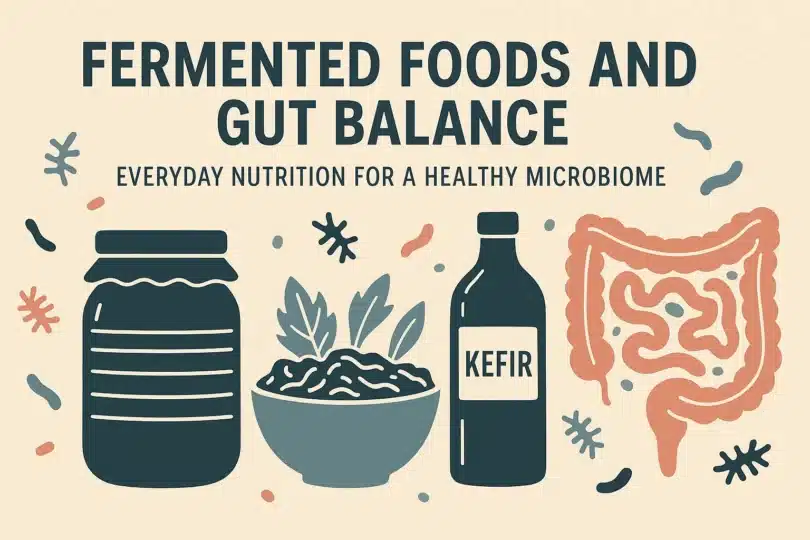Fermented foods have been part of human diets for thousands of years—think yogurt in the Middle East, kimchi in Korea, sauerkraut in Europe, and kombucha in Asia. These traditional foods are more than culinary heritage: they are powerful tools for gut health. By supplying probiotics and beneficial metabolites, fermented foods support digestion, immunity, and mental clarity. In 2025, fermented foods remain one of the simplest and most effective ways to improve gut balance without relying solely on supplements. This article explores the benefits, types, and practical use of fermented foods in daily life.
How Fermentation Works
Fermentation is a natural process where microorganisms—bacteria, yeast, or fungi—convert sugars into acids, gases, or alcohol. The result is a food that is preserved, flavorful, and often enriched with probiotics. Not all fermented foods contain live bacteria, but many traditional forms do. These foods help populate the gut with beneficial microbes while providing bioactive compounds that reduce inflammation and support immunity.
Health Benefits of Fermented Foods
- Improved digestion: Fermented foods increase levels of lactobacilli and bifidobacteria in the gut, reducing bloating and constipation.
- Stronger immunity: Probiotics from fermented foods help train the immune system, lowering risk of infections.
- Mental health support: Fermented foods influence the gut-brain axis, improving mood and reducing anxiety symptoms.
- Enhanced nutrient absorption: Fermentation increases bioavailability of vitamins like B12, K2, and certain minerals.
- Anti-inflammatory effects: Metabolites from fermentation reduce systemic inflammation linked to chronic disease.
Top Fermented Foods for Gut Health
Yogurt
Rich in *Lactobacillus* species, yogurt improves digestion and supports immunity. Look for unsweetened, live-culture varieties for maximum benefit.
Kefir
A fermented milk drink containing dozens of bacterial strains and yeasts, kefir offers broader probiotic diversity than yogurt. It is also well tolerated by many people with lactose sensitivity.
Sauerkraut
Fermented cabbage is a staple in many cultures. It provides beneficial lactic acid bacteria as well as vitamin C and antioxidants.
Kimchi
This spicy Korean dish combines cabbage, garlic, and chili peppers. It is both probiotic-rich and full of anti-inflammatory compounds.
Kombucha
A fermented tea made with bacteria and yeast (SCOBY), kombucha supports gut diversity and provides antioxidants, though sugar content should be watched.
Miso and Tempeh
Fermented soy-based foods common in Japanese and Indonesian cuisine, they support gut balance while providing plant-based protein.
How to Add Fermented Foods to Your Diet
Consistency is key. A small serving daily can improve gut health over time. Pairing different fermented foods broadens the spectrum of probiotics consumed. For example, yogurt in the morning, kimchi with lunch, and kombucha as an afternoon drink. Choose raw, unpasteurized versions when possible, as pasteurization kills beneficial bacteria. Variety ensures a wider range of microbial benefits.
Market Trends in 2025
Fermented foods are now mainstream. Supermarkets worldwide carry kombucha, kefir, and sauerkraut alongside traditional dairy. Plant-based fermented products are expanding rapidly, with almond- or oat-based yogurts and probiotic beverages growing in popularity. The global market is projected to surpass $300 billion by 2030, with high consumer demand for natural, gut-friendly foods. Affiliate opportunities include subscription kombucha kits, specialty fermented food brands, and gut-focused nutrition programs.
Risks and Considerations
Fermented foods are generally safe, but some people may experience gas or bloating when first increasing intake. Those with histamine intolerance may react negatively to fermented products. Kombucha contains small amounts of alcohol and caffeine, making it unsuitable for everyone. Quality matters—many mass-produced products contain added sugar or lack live cultures.
Closing
Fermented foods are a delicious, accessible, and evidence-based way to support gut balance. By providing live bacteria and bioactive compounds, they improve digestion, immunity, and mental health. In 2025, adding yogurt, kimchi, sauerkraut, kefir, kombucha, or miso to your daily meals remains one of the simplest wellness strategies available. Whether as part of tradition or modern convenience, fermented foods prove that nourishing your gut can be both healthy and enjoyable.







